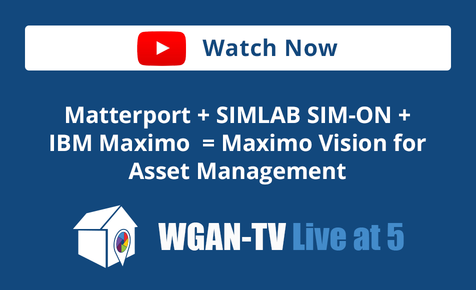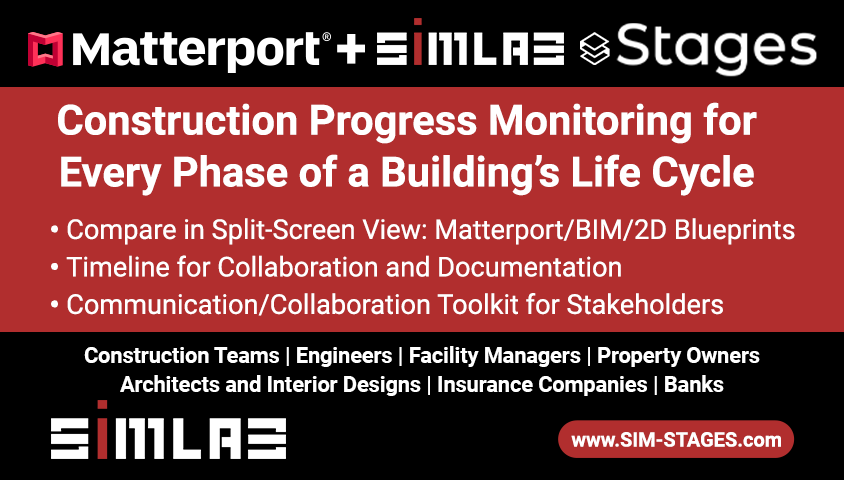Video: Florian Wagner (MESH IMAGES) - Openhaus Pro Podcast17467
Pages:
1
 WGAN Forum WGAN ForumFounder & WGAN-TV Podcast Host Atlanta, Georgia |
DanSmigrod private msg quote post Address this user | |
| Video: Florian Wagner (MESH IMAGES) - Openhaus Pro Podcast | Video courtesy of Openhaus YouTube Channel | 15 September 2022 Germany-based @MeshImages (Florian Wagner) Nice to learn more about you and your company - MESH IMAGES - via Openhaus Podcast with Openhaus Co-Founder Carson Clement (above). Best, Dan Transcript [00:00:03] Carson Clement: Hey everyone and welcome back. We're really excited to be joined today by Florian Wagner. He is actually joining us from Berlin, Germany, which is awesome. We're actually been really surprised with the international interest in Openhaus up to this point. You may not know this Florian. I don't think I mentioned this, but about 50% of our initial Openhaus Pro beta testers for us have been from outside the US. It's been really fun to meet people from across the world. Florian is obviously joining us from Berlin. He is from MESH IMAGES. They do a variety of 3D tours and different 3D services that he's going to tell us about. Then just get into his background experience with Matterport, his opinions about the Pro 3, what he's excited about in Matterport's future. We're just really thankful for Florian joining us on this Friday evening over there. Florian, how are you and feel free to introduce yourself. [00:01:09] Florian Wagner: Thanks, Carson. I'm fine. Thank you. It's 8 PM here. We have a small time shift. My background. Well, I'm 48 years old, so that's quite a lot to tell. I could probably talk for two hours. But I will try to make this short. I was born and raised in Germany, in Munich. Then I studied business administration in Frankfurt, Germany. Then I started my professional career at the end of the year 1999 in the broadcast and media business, in one of the largest media groups here in Germany called the Kirch Group. You may call it the Kirch Group in the United States. This was right at the beginning of the rising of the dot-com bubble. All the listeners may remember this. This media group became famous for having one of the largest film libraries and archives in the world. But it was also active in different fields like TV, sports, entertainment, and technology. I was assistant to one of the members of the board group of directors. Mr. Karl Mauthe. If he can hear this, I would like to say hello and thanks for everything you taught me. Our office was responsible for the group administration and all technical operations within the group, which was basically the end-to-end workflow from production to post-production to content encryption, to play out center to receivers. It was a large group with about 10,000 people working there. Then our technical division, there were about 2,500 people directly working within the group. This is how I came into the field of media and technology. Then something happened, 9/11 came, and the dot com bubble burst and our group came into trouble and had to file for insolvency in 2002. After this insolvency of the group, I started to work for the insolvency lawyer of this group and his team for the following next five years and did the restructuring of companies and I supported the sales processes of all these assets within the group. Then at the end of 2006, I took the chance to make a management buyout of some of the leftovers, which was basically the technical operations around the huge film archive. This film archive carried about 2 million unique physical media assets, all unique hundreds of media types and formats. Our small company, I think we had about 20 people. We specialized in the physical archiving and re-mastering and logistics of film and video and audio material and we had to know how and all these old machines to digitally remaster historical film tape and audio material, mainly movies and series. Some of them originated from the 1920s of the last century until the 19s of the last century. This was really a very special field. The content master itself was stored on a special tape material called HDCamSR. This special tape material was able to store these huge amounts of data. I mean, we are in the year 2007 or '8 now and the digitizing or film was 25 frames per image was huge amounts of data. These tapes were made to store this and the whole logistics went with these tapes. Then came another incident which changed everything and this was the Fukushima incident in 2011. The tsunami over Japan destroyed all the factories over there, which manufactured these tapes. From one day to the other, there was no tape supply anymore worldwide and the whole broadcast industry had to change the workflow to file based workflows. This radical change caused trouble in our company as we were heavily invested in the tape based and machines and so it was time for me to make another change. I founded a family and I bought an apartment in Berlin and moved to Berlin at the end of 2013. I had some money on the bank and I decided to take a break after all this and think. I found out that I wanted to make something more future oriented. I wanted to go somewhere where the sun is shining, seek a prosperous business perspective in the growing new market. I knew this new market had to be somewhere in the online business. Then in 2014, during my break, I bought an Oculus DK2, the early VR headset development Kit. This immersive media experience had blown me away. I was so impressed by the VR 360 immersive experience that I decided to go into this direction. I listened to all the talks of John Carmack and I tried to learn and understand. From Carmack. I've learned that VR in the new media will be more about 3D than 360 and so I started to dive into 3D and did some research online. In 2015 then, after the one-year break, I founded my digital production studio and I named it MESH IMAGES. The initial concept for MESH IMAGES was to be a digital production studio for VR content because of my experience With the DK2, I was assuming that the market for VR content would go through the roof. At first, I tried to sell productions to German TV stations, but this was difficult without a proven record and without reputation or without any of your own VR content in your hands. Well, this is how I came to Matterport. This is how I identified it. I saw that Matterport had all the assets and abilities that I was looking for. Matterport is a capturing system for 360 images combined with a perfect 3D replica of the space. All assets are captured in one process and in one system. It was just perfect for me and I decided to take the risk and buy a Matterport camera to produce some VR content. This was my original intention. Normally, it's better to sell first and then go into some investment. But this time I decided to take the risk. In September 2015, I ordered my Matterport Pro1. At that time I was probably, well, one of the first Matterport users in Germany. Then I started to produce some content with Matterport. What I did was I extracted the assets, the 4K panels and also the OBJ and I created some VR content with these assets. I showed this VR content to potential clients in the VR headsets. These transactions were basically just 360 Panorama slideshows. Then one experience you could walk through in Matterport obj. which we created with unity. It was all very simple. But people who watched this weren't so much interested in the VR experience. But they were very interested in the Matterport showcase itself and especially on mobile phones. This is what the Matterport showcase on mobile phones was the breakthrough. People said, this is the right thing that we need and so I focused more on Matterport itself and decided to make Matterport tours. I contacted the first clients of mine which were all in Munich. I was already living in Berlin as of now. But my first contacts were in Munich. This is how I came into Matterport. [00:09:50] Carson Clement: That is awesome. Hopefully, history doesn't keep repeating itself because some existential catastrophe knocks Matterport out, and we have to switch careers again. [00:10:05] Florian Wagner: I hope not. No, no, no. I'm really very very confident that Matterport that it's on a very good track now. Yeah. [00:10:12] Carson Clement: Yeah, I would agree with that. Well, thank you so much for sharing that background. That's such an awesome story about how you came to be where you're at now and with that first client that you said is from Munich, what kind of client were they? Were they in real estate? [00:10:28] Florian Wagner: No. No. [00:10:28] Carson Clement: What space was your thing? [00:10:31] Florian Wagner: It was completely different. It was the Messe Muenchen. This is the trade show location in Munich. In 2016, I had my first large Matterport project there. This was the convention center for Messe Muenchen ICM. In 2016 it was really big, it had 25,000 square meters, which is about 250,000 square feet, I think, and with a foyer space of 8,000 square meters, 80,000 square feet. We captured the whole space with our Pro2 camera, but without fast scanning. One scan took us one minute, and the whole job took us two weeks of continuous scanning, sometimes 14 hours went a day, but it turned out to be [00:11:23] Carson Clement: Oh, my God. [00:11:24] Florian Wagner: a very very cool project. [00:11:25] Carson Clement: That is a big effort to do that. I can't imagine. [00:11:34] Florian Wagner: Yeah, my feet hurt. Actually, it was really hard. It was a tough job. One of the special things about this job is that one of the spaces was later picked by Matterport for the Matterpak demo material. This was the Matterpak that everybody could download. Then in the second step, Messe Muenchen asked me how much it would be to capture the whole exhibition area. Which measured more than 2 million square feet or 200,000 square meters. Well, I showed them my calculation and they decided not to do it. It was really expensive, they couldn't afford it. But Messe Muenchen continued the cooperation with me, but more in the 3D space. We did modeling, rendering, 360 capturing, and so on. I diversified my business a little bit into 3D, and 360 space. But I also continued Matterporting and in the meantime, but also acquired some customers here in Berlin. Most of them were property agents, almost all of them for residential, which was the easy case. These were some of the big players in Germany, Engel & Volkers may be also known over your location in the United States, and German heroes like Dahler & Company, and so on. This went good until Matterport started to talk and sell directly to my customers or to these large groups as they do today. This was also the time when Matterport changed the business model, and raised prices. I think this was in 2019. I lost some of my loyalty and trust in Matterport these days, I must confess. Then came the pandemic. In the last two years I was focusing more on 3D, and on self-hosted experiences mainly made with 3D Vista. I decided to dive more into e-commerce with Shopify. I dived into all the digital marketing processes that I've learned with Shopify. Shopify is a fantastic system. It's really impressive, and I've learned a lot from that. In the last two years, I've also learned a lot about communication tools, about analytics, about photogrammetry, and also augmented reality. I work with a couple of freelancers, and we built this know-how. We are now integrating this also into our most Matterport showcases. There's another thing that I've learned in the last two years during the pandemic. I've learned to consequently think from the user, and from the customer perspective. I've learned to start from "why." Why should anybody buy my virtual tour? This helps a lot, and just thinking, this is how I came back to Matterport because Matterport does the same thing. Now I'm really bullish about Matterport. I've joined the RACE network in the United States, the Reality Capture Experts network, and I'm now making a bet again on Matterport. [00:14:40] Carson Clement: That's awesome. That's way cool. With MESH IMAGES, what would you say, how is your business split up right now? Are you guys doing a lot of Matterport stuff now or how does your current personal time and business time with MESH IMAGES split between these different categories of work that you all do? [00:15:03] Florian Wagner: The German market is a little bit different because at Matterport, it's not so easy to sell over here because it's hosted in the United States. In the European Union, we have these privacy and data restrictions. Many of the corporate clients are not allowed to use Matterport. This is where you need self-hosted solutions because they have restrictions. They cannot host their data in the USA, and thus, I cannot scan a BMW factory space for example because there's restrictions that they cannot host the data in the USA. This is difficult but I think Matterport- [00:15:55] Carson Clement: Sorry to cut you off. Have you spoken with Matterport about that issue? [00:15:59] Florian Wagner: I think they know it themselves. Nowadays they are listed on the stock market, and I think they will also change. There's talks between the European Union and the United States about how to find a way to get along with this but I think we are waiting for five years now for these discussions to come to an end result. [00:16:31] Florian Wagner: It takes an awful lot of time. Yeah, this is just these privacy restrictions and hosting restrictions, and data protection, and so on. This is a bit difficult in Europe, and especially in Germany. [00:16:46] Carson Clement: Yeah. [00:16:46] Florian Wagner: Anyway, I think you can use Matterport in many use cases. I think in real estate, in construction, AEC is a huge market, and the other huge market that's quite ahead in front of us is retail. I'm unconvinced that retail will jump on the Matterport train because Matterport enables them to open 24/7. Their space, this is the showroom, the flagship store. You can open it 24/7 with a Matterport tour. This is something that store owners will do. I think retail will be coming. [00:17:36] Carson Clement: Yeah, I agree with that. I think one of the benefits of retail is, with AR you can preview, add an object in your space which has a ton of value. Sometimes those error models aren't the most high-quality or the colorings a little off but I think what's cool about a virtual showroom is it helps provide more context of a product and what size it is compared to other objects in a space, what it looks like from all the way around. [00:18:11] Carson Clement: The flat e-commerce website is not really a replication of a retail experience, and so being able to actually have retail experiences online in a way that's immersive and feels like you're going to a store, I think as Matterport continues to improve, as us at Openhaus continue to build better e-commerce solutions and then just as VR, and these 3D experiences become more acceptable or expected. I think you're right. I think we'll see retail really get the point because up to this point, there's just been a lot of these different things that have held stores back from wanting to really embrace Matterport. [00:19:00] Florian Wagner: - Yeah, I think so too. Always the same grid in online stores. I think this is currently selling but this is not a product experience. You can add more information in the ThreeSixty space. You can add a video and explain things and push people to the buying decision much better than in an online store layout. I think this is one of the chances that we have with immersive experiences. In retail to drive customer interest and to tell them things and to teach them about the product to make them buy it in the end. [00:19:41] Carson Clement: - Yeah, definitely. We've talked about different things that have you excited about Matterport. Again, one of the things that has been big news in the Matterport and 3D space is obviously the announcement of the Matterport Pro3 camera. What's your initial reaction? Are you getting a Pro3 camera? What are you excited about? What are you disappointed in? What's your initial reaction to the Pro3 Matterport camera? [00:20:10] Florian Wagner: - Well, the Pro3 is a completely new camera and I think you need to buy one to stay in business. You cannot compete without the Pro3. The Pro3 comes with outdoor capture. It comes with a LIDAR for high ceilings for much bigger spaces. It has this wonderful new optic one-inch sensor and powerful single lens, which will also eliminate some problems of the old Pro2 with this carved out image effects. I think it has the exchangeable batteries as well. In theory, you can let your camera roll 24-7 without charging it again. I think these are all advantages and you cannot compete without having a Pro3. But the even bigger announcement for me this week was the release of the new Matterport Cloud, and they changed something. They changed from this 50k polygon limitation from the download of a space to the streaming of a space. Now, you can create spaces of almost unlimited size as they write. I think this is to step into the metaverse, and this is why you will need a Matterport Pro3 to build these huge experiences. Now with a Matterport Pro3, we can scan an IKEA. This was not possible with the Pro2, or with the limitations of the 50k polygon mesh, it was impossible. You had so many objects in there. You couldn't scan an IKEA with about 200,000 or 250,000 square feet in one model. But now it will be possible and this will change a lot of things. This will open new possibilities for Matterport, also for Openhaus. [00:22:18] Carson Clement: - Yeah, I agree. With both of those things combined, I just think that your perception of what's possible to capture really is just totally changed. You can capture more city blocks. I think some of the spaces they showed were basically a city block or a large building with multiple floors and the external entire block area outside. I think you're right. [00:22:55] Carson Clement: Some of our business to business clients that we're working with have these large properties that before we were thinking we'll just make separate tours of all these different spaces on their property, but now it really becomes possible one just from a logistical scanning perspective that you can actually scan that place in a consistent and quick enough way. But then also have the ability to even load and stream and view that space. It's really exciting for sure. [00:23:25] Florian Wagner: - Yeah. [00:23:25] Carson Clement: - I think a lot of the negative feedback I've heard about the Pro3 is that basically a lot of Matterport Service Providers, they are doing a lot of just residential scanning. Most of their business is just scanning for real estate listings. But to me, if I were in their shoes, I think the scanning time between new iPhone chips, first of all, plus this new Pro3 camera. I think the time to even scan a residential space should be cut down significantly as well. Anyways, we're excited about it for all different types of reasons. [00:24:13] Florian Wagner: - Yeah, absolutely. I think that Pro3 can be a breakthrough and the pricing is okay. It's $6,000. You need some more packs, about $6,500. I think 6,000 with the extra batteries. I think if you buy it, you will have this Matterport moment again. You will be invited to scan something just to show this camera and how it works and how the dollhouse looks and what you can do with it. And to compare the image quality with a new one-inch sensor lens, which is much better. For us in retail, I want to focus on retail. We will have these night scans when it's really dark, sometimes also outside and inside, and thinking of shopping windows, etc., and this will be great with a new camera. [00:25:16] Carson Clement: - Yeah, definitely. Have you ordered yours yet? [00:25:20] Florian Wagner: - Not yet. [00:25:21] Carson Clement: - Same here. It's funny. You say that because when the announcement came out, we were like, let's order this right now and then we got distracted and then three days later, we're like, wait, we got to order this because obviously, they may have limited inventory, so we actually finally did order ours. But it's funny you say you haven't because we spaced ordering ours as well. [00:25:48] Florian Wagner: - Yeah. I need one. Probably this weekend I will also order. [00:25:53] Carson Clement: - Yeah. Definitely. Well, Florian, we're definitely going to have to make another call soon. We got through half of what we planned on, but we'll definitely do another call soon. We talked a lot about just Matterport in general, obviously, with Openhaus and other SDK partners. We're building things on top of Matterport. I'd love to talk again in the next few weeks about your perspective on SDK partners and what that means for the future of Matterport. We'll have to save that for another time. I can talk to you all day. I'm sure we're going to have more conversations. [00:26:34] Florian Wagner: Yeah. Of course it would be great. Thanks. Carson. Thanks for the invitation. [00:26:39] Carson Clement: Yeah, you bet. Again, thank you Florian from MESH IMAGES. You can learn more about MESH IMAGES at meshimages.com. Is that correct? [00:26:48] Florian Wagner: Correct. [00:26:49] Carson Clement: Awesome. Anyways, that concludes our chat for today and we will see y'all next time. |
||
| Post 1 • IP flag post | ||

|
MeshImages private msg quote post Address this user | |
Thanks for posting, @DanSmigrod! You are always perfectly informed, what’s going on in your network  |
||
| Post 2 • IP flag post | ||
Pages:
1This topic is archived. Start new topic?
















